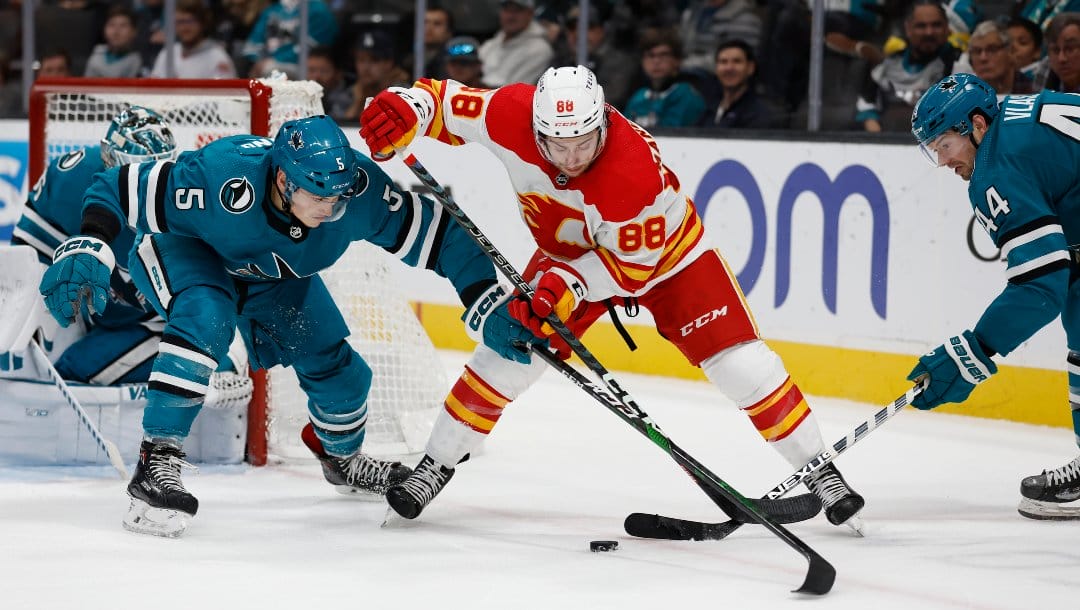- In the NHL regular season, teams play 82 games — 41 each at home and away.
- The top three ranked teams in each division advance to the playoffs.
- Two Wild Card teams from each conference also advance.
- The playoffs are a four-round elimination tournament, ending with the Stanley Cup Final.
- Each round of the playoffs is a best-of-seven series.
NHL teams and their fans are always focused on Stanley Cup odds, but there are a lot of rounds of play before a team gets anywhere near the Final.
It goes without saying that every professional sports league has its own format, but the NHL’s structure can be a particularly confusing one.
So, what is the NHL schedule format, and how do the playoffs work?
Period three, goal three!!!#GoAvsGo pic.twitter.com/opvkEgIj5V
— x – Colorado Avalanche (@Avalanche) December 14, 2022
NHL Regular Season
The NHL regular season sees each team play 82 games — 41 at home and 41 away — to determine their standings. Each team plays 26 divisional games, 24 intra-conference games, and 32 inter-conference games, resulting in every team in the league playing every other team at least twice.
Standings are decided by points accumulated throughout the regular season. Two points are awarded for wins (including in overtime or shootout), one point for a loss in overtime or shootout, and no points for a loss in regulation time.
NHL Postseason
The top three teams in each of the four divisions advance to the playoffs, along with two Wild Card teams from each of the two conferences. The playoffs consist of four best-of-seven series, with the last one dubbed the Stanley Cup Final.
The eight playoff teams from each conference are seeded based on their regular-season records, as well as their position in their division or status as a Wild Card team. This can all get a bit confusing, so bear with me.
NHL playoff schedule 2021: Updated bracket, dates, times, TV channels for every semifinal series – https://t.co/7jMoVzWl2S pic.twitter.com/nH4zpRAmUn
— Balls and Bells (@ballsandbells) June 11, 2021
In the first round of the playoffs, each conference’s eight playoff teams are separated into two brackets. Each bracket is comprised of the top-ranked team in a division, the second and third-ranked teams in that same division, and one Wild Card team assigned based on their regular-season record.
The top-ranked division winner in each conference faces off against the Wild Card team with the lower record in the same conference, and the lower-ranked division winner meets the Wild Card team with the highest record. The second and third-ranked teams in each division play each other. This means that the two brackets in each conference look like this:
| EASTERN/WESTERN CONFERENCE DIVISIONAL BRACKET 1: |
|---|
| Seed 1: Division winner with best record |
| Seed 2: Second-place team in same division as Seed 1 |
| Seed 3: Third-place team in same division as Seed 1 |
| Seed 4: Wild Card team with second-best record |
| EASTERN/WESTERN CONFERENCE DIVISIONAL BRACKET 2: |
|---|
| Seed 1: Division winner with second-best record |
| Seed 2: Second-place team in same division as Seed 1 |
| Seed 3: Third-place team in same division as Seed 1 |
| Seed 4: Wild Card team with best record |
The first round of the playoffs will see Seed No. 1 face Seed No. 4 in each of the four divisional brackets, and Seed No. 2 will face Seed No. 3. The second round keeps the teams in their same brackets, with the winner of the series between Seeds No. 1 and No. 4 facing the winner of the No. 2 vs. No. 3 series.
The third round of the playoffs is the Eastern Conference (Atlantic vs. Metropolitan divisional bracket winners) and Western Conference (Pacific vs. Central divisional bracket winners) Finals. The champion from each conference will meet in the fourth and final round of the playoffs, the Stanley Cup Final.
NHL Playoffs Home-Ice Advantage
For the first two rounds of the playoffs, the higher-seeded teams have the home-ice advantage, regardless of regular-season point record. For the third and fourth rounds, the team with the better point record through the regular season has the home-ice advantage, regardless of seeding.
All series in the playoffs are played in a 2-2-1-1-1 format. This means the team with home-ice advantage hosts Games 1, 2, 5, and 7, while their opponent hosts Games 3, 4, and 6.
Hockey Betting at BetMGM
At BetMGM, you have access to updated odds for NHL betting at the best online sportsbook. From daily hockey betting lines to hockey betting odds and props, BetMGM is the best place to bet online throughout the year.
If you don’t have an account, sign up for the sportsbook welcome promo, one of many sportsbook offers at BetMGM.










